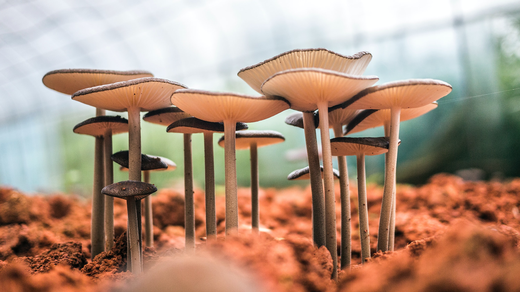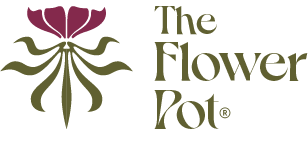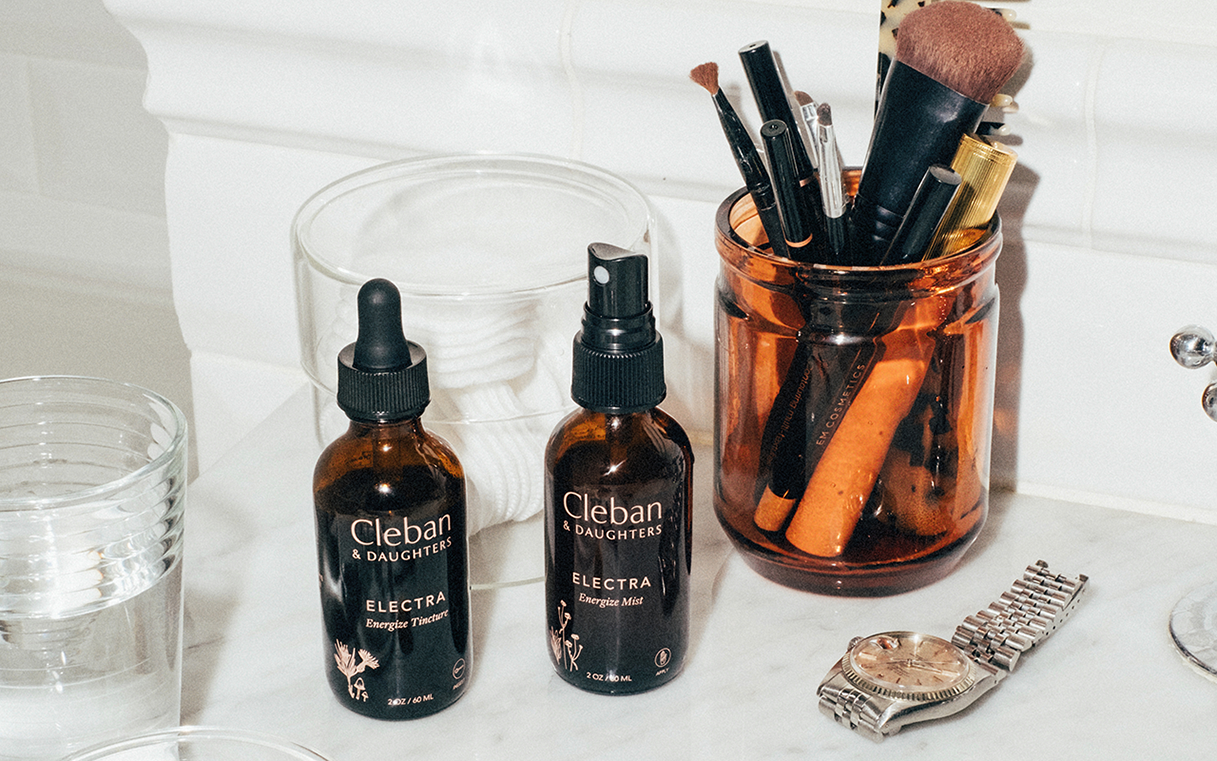
Feeling Fungi Curious? An Introduction to Medicinal Mushrooms
By Rebecca Kershberg
So, you’re interested in medicinal mushrooms. Not porcini or chanterelles, although those are lovely, too. And not magic mushrooms, those are for another time and place. Now, you’ve heard that certain mushrooms might have healing powers – mental or physical – and you’re eager to dip your toes into this new wellness pool.

That’s where we come in. We’re partnering with some excellent brands that have been working with mushrooms for so long, fungi is practically in their blood. And in the interest of helping you make the best, most well-informed decisions for your body, we’ve put together a little cheat sheet on the world of fungi and their various health benefits, and why they’re worth your while.
Your new best friends: Lion's Mane and Turkey Tail
First, a quick explainer: medicinal mushrooms are different from culinary mushrooms or psychoactive mushrooms in a few specific ways. They are more than just food (think of them as functional food, although, actually, some are not edible) and they will not get you high. They are considered medicinal mushrooms because they have certain compounds or metabolites that have been shown to have health-enhancing effects on our bodies and minds. Common species names you’ve probably heard thrown around are Lion’s Mane or Chaga (more on these later), but these represent just a small percentage of fungi in the medicinal mushroom category and we’re learning more every day as research and interest in medicinal mushrooms in the Western world ramps up.

RELATED: LION'S MANE FOR BRAIN HEALTH
Mushrooms Contain More Goodness Than You Can Imagine
Holliday Cartar, the Head of Business Development and Sales at Rainbo, a Canada-based brand that produces medicinal mushroom supplements, believes that the very particular nature of mushrooms is what makes them so special. Though they’re often sold alongside broccoli or kale, they’re really nothing like them at all. “If you are new to the world of mushrooms, the first thing to understand is that mushrooms are not vegetables,” she says.
“Mushrooms are fungi and they belong in their own biological kingdom, the fungi kingdom, completely separate from plants, animals and other microorganisms.”
Understanding what mushrooms are – and what they are not – is the key to demystifying them in the wellness world. “There appears to be a mycophobia, or fear of fungi, in Western societies,” says Holliday. “Growing up I thought that I would be poisoned if I touched a mushroom growing in the forest. Mushrooms are actually what keep the forest alive.” Shelby Hartman, the Editor-in-Chief of DoubleBlind, a bi-annual magazine dedicated to psychedelics, concurs.
“Mushrooms are integral to our entire ecosystem here on planet Earth,” she says. “They literally allow plants to communicate with one another.”
Medicinal Mushrooms Are Loaded With Health Benefits
So if medicinal mushrooms are so important, why do they have such a shaky reputation in Western cultures? The answer is complicated, but both Holliday and Shelby point to the strict structures of Western medicine practices and the tricky and profit-incentivized healthcare research system, as well as mushrooms’ perceived connection to psychedelics as the main reasons. The result is that there is not a huge amount of (Western) peer-reviewed scientific research out there on mushrooms and their health benefits and so even mushroom experts can’t use the FDA, for example, as a backup when extolling the virtues of fungi. Luckily, the tide is starting to turn. Just the fact that you’re reading this, shows that medicinal mushrooms are becoming increasingly visible as potential sources of healing and relief and the science community is beginning to cotton-on.

In the meantime, we have hundreds of years of anecdotal evidence to draw on. “Traditional medicine has its own form of statistical power that cannot be replicated in a clinical trial lasting 2-5 years,” says Holliday. “Hundreds and thousands of years of careful observation of the human condition leads to the formation of traditional medicine practices, where medicinal mushrooms have been prominent.” Liana Pekelharing, co-founder of Cleban & Daughters, a beauty and wellness brand dedicated to the benefits of plants and botanicals echoes this. “Sometimes I think: why do we really need science to prove medicinal plants are effective when they have been used for thousands of years in an efficacious way,” she says.
“The best proof is to try herbal remedies yourself. Either work with a herbal practitioner, try one ingredient tinctures so you really get a sense of how that herb affects you or buy multi ingredient formulas from trusted brands. And tune in: focus and feel how they are supporting you physically and energetically. That is the best proof.”
In Asia, there are more than 100 types of mushrooms used to treat cancer. Some of the more common ones are Ganoderma lucidum (reishi), Trametes versicolor or Coriolus versicolor (turkey tail), Lentinus edodes (shiitake), and Grifola frondosa (maitake).
So what should you be looking for, and what medicinal mushrooms do what? “My favorite mushroom changes all the time,” says Holliday, but right now she’s partial to Lion’s Mane. “The more studies I read, the more impressed I am. This medicinal mushroom supports brain health (super sexy!) and produces compounds that can pass through the blood-brain barrier and promote the growth and protection of nerve cells. Clinically, Lion's Mane has been seen to have therapeutic potential in improving mild cognitive impairment as well as in treating depression and anxiety mood disorders.”

Your Immune System Will Love You For Loving Medicinal Mushrooms
Liana has included Lion’s Mane and Cordyceps in Cleban & Daughters’ Electra tincture. Cordyceps has long been associated with improving energy, stamina and endurance. “It contains high amounts of adenosine and cordycepin which are precursors to ATP production, so at a cellular level, Cordyceps literally helps your body produce its own natural energy and in turn, improve physical performance,” she explains.
Chaga is another popular medicinal mushroom nowadays, revered for its anti-inflammatory and immune system boosting qualities. Ultimately, as Liana suggests, the best way to test out the benefits of medicinal mushrooms is to simply try them for yourself. They may not be the one thing that “saves” you, or they may turn out to be just the thing you’ve been looking for on your journey to feeling good every day. The key is to trust your body, and in the meantime, we’re here to answer any further questions you might have about medicinal mushrooms. We think they’re pretty fantastic and, as always, we’re here to help here at The Flower Pot.
Ready to try them for yourself? The Flower Pot carries several brands that work medicinal mushrooms into their glorious plant-based products. See below for a few of our favorites. Happy foraging!
Want to get into the weeds of mushrooms? Here are a few resources to get you started:
Lion’s Mane:
- https://www.medicalnewstoday.com/articles/323400#potential-benefits
- https://www.verywellmind.com/the-benefits-of-lions-mane-89474
Cordyceps:
- https://www.ncbi.nlm.nih.gov/pmc/articles/PMC3909570/
- https://www.quickanddirtytips.com/education/science/cordyceps?utm_source=sciam&utm_campaign=sciam
Chaga:
- https://www.medicalnewstoday.com/articles/318527#Nine-potential-benefits
- https://www.mskcc.org/cancer-care/integrative-medicine/herbs/chaga-mushroom
Rebecca Kershberg



